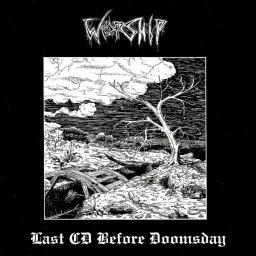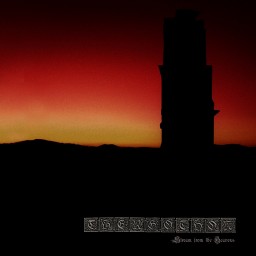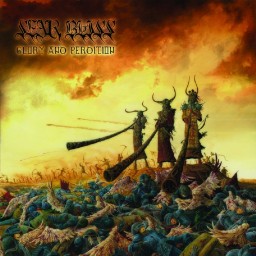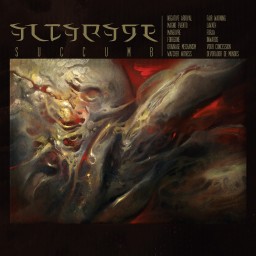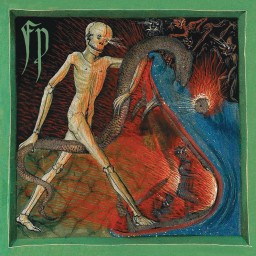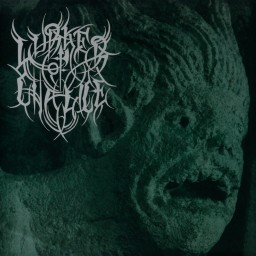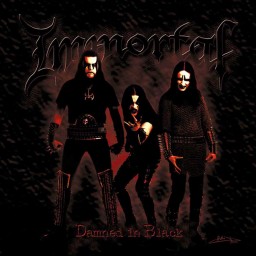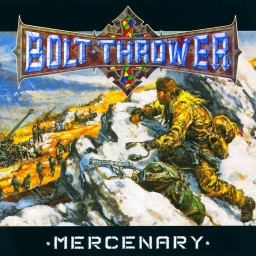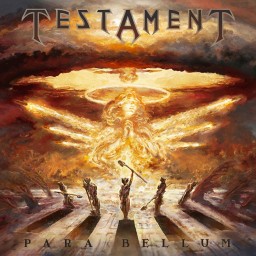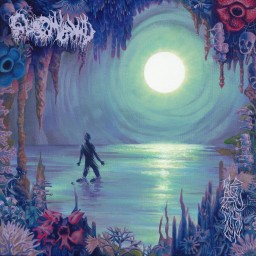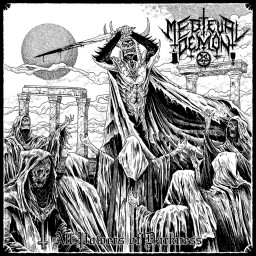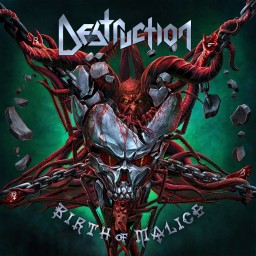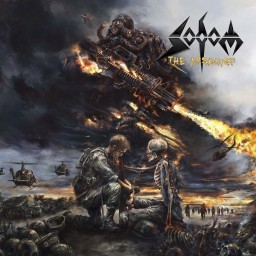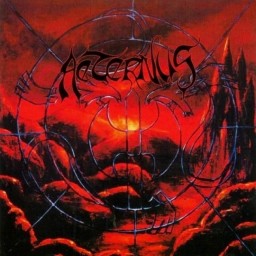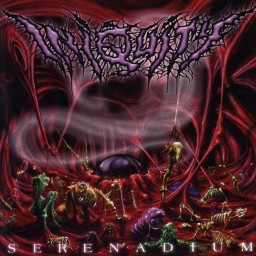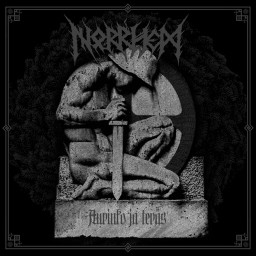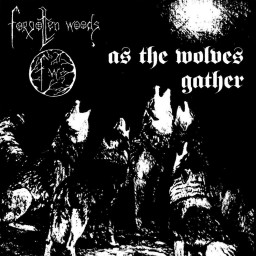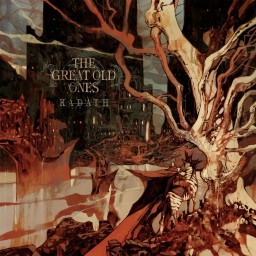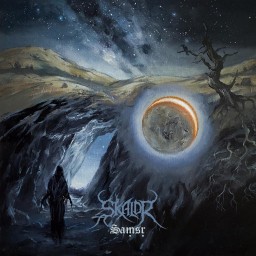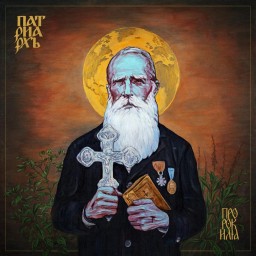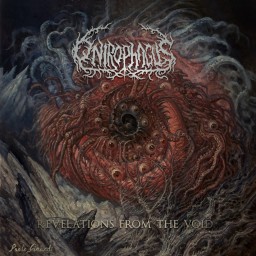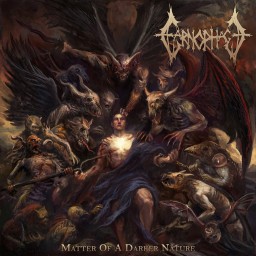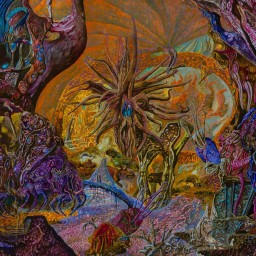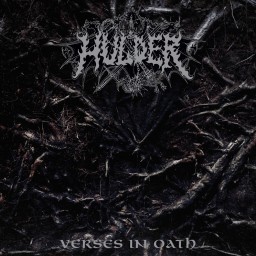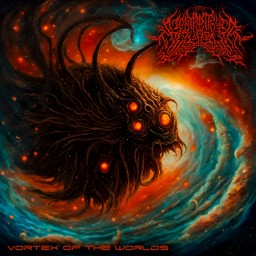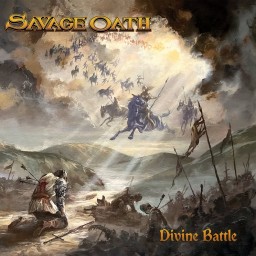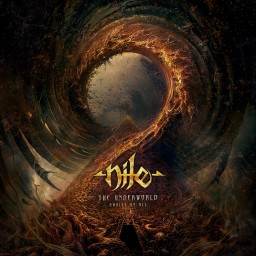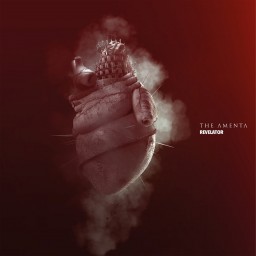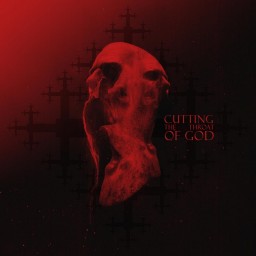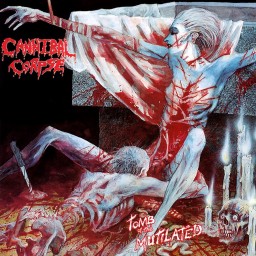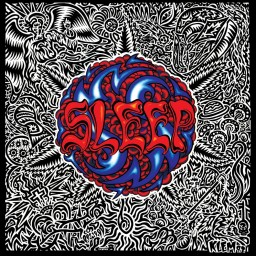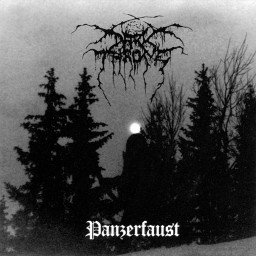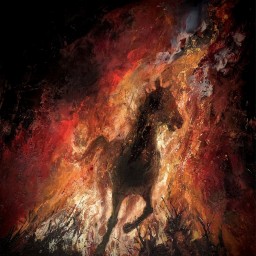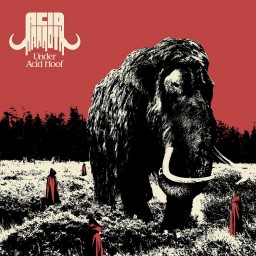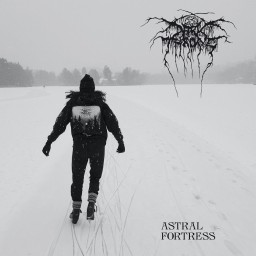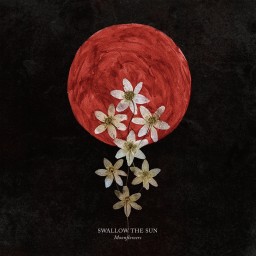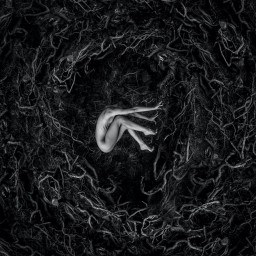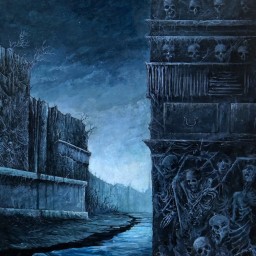Vinny's Reviews
This one was a bit lost on me I am afraid. Now, I (sort of) get the reason why it is so revered. The album is as true a revelation of genuine pain and emotional darkness as I have probably ever heard, that cannot be denied. If you are a seasoned funeral doomster then there is a lot to be drawn towards here. The underground aesthetic to both the sound and the title of the album also carries some appeal to the anti-establishmentarian in me. As awful an event as it was, the tragic suicide of the drummer/singer, Fucked Up Max has probably garnered this record a little more attention that it actually deserves in my book. Whilst I can acknowledge all of the points above, the fact is that the means with which Worship deliver their art form is just too disconnected for me.
To me this does just sound like two blokes in their bedroom, playing the first thing that comes into their heads. It might be crushing, it might be agonisingly slow and literally bleeding melancholy everywhere but it just isn't good either. As a fan of extreme metal, I do not type the above words easily, but to me this has two distinct halves it could fall into. On one hand it is absolute brilliance, landing in that spot due to simple organic connection between each other and the music fan listening to it. If your life is genuinely so consumed by depression and misery and you happen to have some instruments and recording gear, then this is exactly what I would expect any such recording to sound like. However, the other half this could land in is where it can also just seem lazily constructed, and that is fully accepting it is a demo. My issue here is not just necessarily the content itself, more how appreciated it is in general when the actual merits are so scarce.
Maybe I am finally finding my limits in metal music after nearly four decades, who knows? I almost want to like this more than I actually do, however I must always write my honest reflections on what I hear and this one simply just does not land well with me. There's barely any percussion, which is a big thing for me in driving music forwards and I guess I just miss that vehicle too much here, never quite getting invested in what is playing as a result.
Genres: Doom Metal
Format: Album
Year: 1999
Exploring early funeral doom is fast becoming my favourite way to relax. It really is testimony to the knowledge of the creator of this clan challenge (The Fallen: Doom Metal - The Early Days) as to how good an introduction to the clan this list of releases is. Until recently I had only really listened to Bell Witch's Mirror Reaper as my only regular experience of funeral doom. Understanding where the whole sub-genre that influenced that record comes from is a real treat. As with my review of Winter's Into Darkness, I find the sheer simplicity of Thergothon's Stream From the Heavens to be remarkable in the sense of the immersive atmosphere that it creates. Not that Winter's debut was dripping with high production values, but Thergothon's debut sounds like it was recorded in a basement somewhere in their native Finland.
What makes this album more remarkable is that there was only three members who recorded all this. Sharing vocal, keyboard and guitar duties across all three of them (with drums handled solely by Jori Sjöroos), Stream From the Heavens is a real team effort. This is not only dripping in atmosphere folks, it is heavy as fuck as well. It takes the blueprint of Into Darkness and ramps up the weight dramatically. The funeral atmospheres are serviced brilliantly by the almost black metal vocal style that sits alongside those dreary clean vocals (that also have a fair amount of spoken word alongside them). These grim and deathly croaks add a real dimension to this record and are perhaps my favourite part of the whole experience.
I guess my only mystery here is why this album is called Stream From the Heavens when this sounds like it comes up from the opposite direction altogether. Consistently, the record pulls you further and further into the agonisingly slow and dense atmosphere that it creates without making the whole experience feel like it goes on for too long. At a shade under 41 minutes, this album is a perfectly palatable slab of music that never feels like it outstays its welcome. It is bizarre how such fetid sounding vocals and crushing riffs can relax me so much but this album replaces any weight on my shoulders with a much different and more interesting weight I guess.
Genres: Doom Metal
Format: Album
Year: 1994
To the best of my knowledge, I have never heard any Hungarian metal regardless of any sub-genre guise. Somehow, over the last nearly three decades, I have never come across Sear Bliss. Whilst I cannot recall having heard even a fleeting few bars of any of Glory and Perdition, somehow it does sound familiar. After one full listen through I was already marking similarities with Summoning where Glory and Perdition used horns and synths to note its presence in the room. The fact that I do not mind a bit of Summoning one bit probably helps me to register and accept the use of electronic and symphonic elements on this month’s feature release even though I am not a massive fan of the symphonic black metal sub-genre overall.
Having said that, I do not find this album to be overly symphonic, despite a near constant feed of orchestral instrumentation. It certainly plays an important supporting role in proceedings but is never allowed to dominate. Instead, those brass instruments create a swell in their delivery, expanding the sound of the album as the intricate keys tantalise with the promise of further wonder to come. Often these elements are played in as simple stabs or flourishes and as such are beautifully paced over the album. In the traditional sense it is the guitars that drive proceedings the most, with their riffs propelling the tracks forward. The charging opening to Two Worlds Collide underlines this input superbly. Also noticeable are the drums as they thump away in just the right space in the background to support the other component parts and keep everything tracked together nicely. Check out the superb work being done on Dreams Spectre to properly capture the contribution the sticks make to this album. This balance of the instruments and the atmospheric and symphonic elements is expertly done; using the alien voice on Reverie is a bold move yet it sits well atop of the music without feeling intrusive or downright odd.
Sear Bliss also manage to carry off the inclusion of some interludes on the album, doing this well in the sense that they do not disrupt the flow of the overall record. Normally when I see such compositions dropped into any album, I die a little inside as I just find they often scream “FILLER!” in my experience. The three here (one is the outro I guess) are all around the minute and a half mark and do transition the album nicely.
Whilst not anywhere near as aggressive as I normally like my bm, Sear Bliss do deliver melodic bm well. There is a sense at first that it is put together a bit hap-hazard but as I revisit the album there is a sense of coagulation across all tracks and this makes me think it is more planned than it first appears to be. With repeated listens the blasting pace is most definitely there, and it never feels out of control or rudely cut off by any of the pace or tempo changes. Although not staggeringly so, the epic nature of the writing here belies a band that I at least need to give a little more attention to. I note that Mayhem’s Attila and proffers vocals on two tracks here suggesting that this is a band with a good degree of stature in the underground already. In many ways Sear Bliss are reminiscent of a more aggressive Negura Bunget. This mix of earthy structures interspersed with the astral bursts of rich and lush melodies such as on the track Glory to Perdition reminds me of the Romanians only with a much-reduced level of complexity or extravagance.
Ben seemed to be a tad pensive in announcing this as his feature for the month, but I think this has been an excellent choice and one that certainly rewards with repeated listens. With the cosmological parts set firmly in their place around the core bm elements, Glory and Perdition captures an experience as opposed to just being an album to listen to. In its more atmospheric moments, it reminds me of Darkspace / Paysage D’hiver and in the more traditional moments it can hold its own with any of the bands I mention through out this review. I think the only criticism is that it is not as instantaneous an experience as some might want and the fact that it does need a few listens may put some off. The work is worth the reward though and the album records a healthy four stars which may creep up as I continue to put this on rotation.
Genres: Black Metal
Format: Album
Year: 2004
It is safe to say that I am a huge Altarage fan. I mean as someone who has heard a lot of death metal in my time it is hard for me to really get overly excited about much of what comes out nowadays in the genre, however Altarage share that rarefied atmosphere with the likes of Gorguts and Ulcerate whereby I am liable to buy pretty much anything they put out without hearing it first.
This methodology served me well with their last effort The Approaching Roar but I was a tad caught out by the predecessor Endinghent when using this admiration of the band to drive my purchase. I broke away from this tradition with Succumb and played a track on a promo CD that came on a cover mount. I didn’t enjoy it one bit in all honesty and couldn’t quite figure out why until I refused to believe that the band had finally dropped a real dud and went and bought the gatefold vinyl anyways. Altarage are masters of performance art, whether that be a conscious effort on their part or not, this is how Succumb plays to me.
Each track is in effect a shift, a progression, a development on theme. The album runs like a play on stage with each track being an act, building constant depth and expansion to the proceedings and therefore the single track on the CD I mentioned gained no traction with me – it was completely alien when taken out of the context of the whole album piece.
This is a very tactile listening experience for me. Seemingly designed for that one sitting listen through for you to fully appreciate the quality of the album. There are no real individual parts to call out as such as despite there often being clear breaks between tracks it all feels interconnected and cohesive to the point of being conceptual almost. Track lengths vary and at first glance the format looks busy and confusing (which is part of the charm for me of listening to a complex release and trying desperately to unravel it) however this structure to the composition of the album track listing is devilishly clever. The build that gets created here is superb and it sets some tracks up to be real eruptions of powerful and cavernous death metal that simply vents at various parts of the album.
On more than one occasion the hairs on my arms stand up and I genuinely must stop what I am doing with the final half of the last track on side two being one such moment that leaps out at me. The permeance of the wall of sound just reaches an absorbing and almost comforting crescendo during some of the most horrifying noise to grace my eardrums.
The guitar tone has an almost bastardised sense of groove to it on occasion and makes real use of the blackened tremolo influences that have been a trait of the band from day one. The vocals sound completely otherworldly throughout. Their extra-terrestrial sound acts as paroxysms of scathing and terrifying lyrical outbursts. I also must point out the understated yet atmospheric importance of the drums. They vary superbly across the record ranging from blast beats to soft cymbal “tishes” to adapt to the pace, tempo and atmospheres of the album.
Succumb is an album that occupies the space around it as it plays, placing the darkest of voids and most cavernous of chasms in the room with the listener as it goes along. One of the standout releases of 2021 so far.
Genres: Black Metal Death Metal
Format: Album
Year: 2021
As I alluded to in the forum thread for this release, I had previously attempted to digest Achatius and found it to be a release that I couldn’t quite get my head around upon first attempts to unravel what seemed like a vast and serpentine soundscape. Upon repeated listens however there is a lot more to Achatius that appeals to my current taste in BM than first meets the eye.
A side from bountiful lashings of Darkthrone, with a seasoning of Bathory in those riffs there is the structural integrity of Mortuary Drape to most tracks. Achatius as such plays as a BM record powered by an Italian Prog Rock mentality. The style fits the song content perfectly (it is a story that is being told here after all) yet there is no sacrificing of the raw BM elements that cater for my more extreme tastes.
These song lengths that at first seemed so challenging (the shortest track being just over 11 minutes) are in fact superb chapters of this story made succinct that encourage you to move with the tale as it unfurls. What this does is help focus your attention, I find that I can stop listening after two tracks to digest what has just been presented and then pick up again later in the day the other half and still have that sense of flow to the record.
As well as nods to the classics there are also references to more modern sounds such as Malokarpatan and Master’s Hammer. The traditional/heavy metal credentials stack up well here amongst the other elements. For an album with eclectic artwork, it doesn’t actually come off as sounding the same as the cover art suggests. It is more of a well-balanced affair overall that can still stay true to its BM roots throughout. The blend of genres/styles is quite subtle and as such it is an album that requires much attention to truly get underneath the skin and appreciate the sum of all parts.
There’s chimes and bongs in the background that give an ethereal royalty to proceedings with their echoes drifting long into the ether of the record as it plays. The strength overall of the record though is its balls. To be able to take such an open approach to the delivery of such a strange theme takes guts and for a one-man project to manage to make it such a success is doubly impressive.
Genres: Black Metal
Format: Album
Year: 2019
This is the work of a soul drenched in sorrow. Finding in the unimaginable weight of the darkness the creative ability to embrace multiple forms, styles and sounds of music to produce a work that is harrowing, avant-garde, expansive and above all else capable. Wrest is known for his work with his Leviathan project, rightly getting credit for the darkness he creates under that pseudonym for it's bleak ambience and death-hazy resonance. Lurker of Chalice was arguably the father of Scar Sighted and you will certainly pick up the vibes from Leviathan's 2015 release here.
I haven't heard many albums that in the midst of such organically generated fear and menace manage to still soothe and calm the soul at the same time. For all the perilous gloom Wrest creates here he blends perfectly elements of post-everything (I am not kidding) whilst adding doom like atmospherics and songwriting to the album at the same time. He concocts structures made out of pure desolation, emptying the contents of a damaged and fragile soul into a stark and arid desert of human misery.
In just less than an hour you will find yourself afraid, fearful of what lurks in every shadow of your own mind as this record twists and contorts itself around your very own psyche. Yet you will also find solace here. It is a dark dressing for the gaping wounds on all our characters, a soundtrack to all of our nightmares that rationalises and makes tangible their form. It is the nefarious voice in all of us that fears our ability to be anything other than pale shadows on this mortal coil.
Genres: Black Metal
Format: Album
Year: 2005
Unexpectedly coming out on top of the current crop of feature releases is this three track EP from Trivium. For no reason other than rampant elitism, I have avoided Trivium for most of their career. Based on this EP, that could have been an even dumber decision than it first appears. Notwithstanding that this is a very short format to base any long term opinions from, there is still plenty here to have kept me entertained over the six or seven listens I found myself giving Struck Dead in just one day!
It is clear that my view that Trivium are just another annoying metalcore band are incorrect. Yes, there are elements of that style here, I cannot dispute that. However, there are some serious grooves going on during the riffing on ‘Bury Me With My Screams’. The cold, blunt and almost industrial chops of the title track are a bruising experience also. Add into the mix the fiery leads and anthemic vocals and there is a lot to be pleased with. Whilst I expected high energy levels to be on show, the EP goes much further, possessing an almost hardcore ferocity at times.
It is not an annoying overactive energy that I feared might haunt the release, there is a lot of maturity in these three tracks. ‘Six Walls’ might be the weaker of the tracks on offer but it is by no means terrible. After the intensity of the two first tracks I guess some balance was needed, even if those acoustic strings on the final track do mislead the listener into believing we will be needing on a power ballad. Suffering a little in the arrangement stakes, ‘Six Walls’ feels like a b-side at best but still keeps those energy levels well primed for the whole EP duration.
Genres: Metalcore
Format: EP
Year: 2025
How do you follow an album like At the Heart of Winter? Widely praised as Immortal’s best album as well as being considered a pinnacle black metal album, AtHoW was always going to be a tough record to follow up. Whilst it is widely acknowledged that Damned in Black does not live up to the standard of AtHoW by any means, I would challenge the notion that this is a bad Immortal album. Its placement in the discography almost gave it a 50/50 shot by proxy. Either this was going to be the best Immortal album ever or it was just going to be another Immortal album.
We most certainly got the latter option. Like Battles in the North, Blizzard Beasts and even Pure Holocaust, Immortal’s 2000 album suffers from the common affliction of lacking much in the way of standout tracks. Memorability of all those albums is low for me and Damned in Black falls into the same category. It has had around seven or eight plays this past week alone and I still feel no closer to being able to run through a track in my head, in its entirety. The familiar smash ‘n bash sound of Immortal is sort of why I love them though, so it is hard to be too disgruntled with DiB.
Whilst individuality of tracks is nowhere near anything on AtHoW, Immortal still were trying on DiB. The razor edge riffage, battering ram drums, grim vocals and even audible bass are all on display. In terms of the energy being applied here, you’d be pushed to call any of the tracks as being half-arsed in terms of effort of delivery. It is obvious however that the bar was just set too high coming into this record. Tracks such as ‘My Dimension’ are completely guilty of exhibiting the blatant hallmarks of filler here and that is a shame given the noted effort behind even the less influential tracks.
There is a flip side to this though that can be found in the structures of tracks like ‘Wrath from Above’ as well as the title track. Still, the promise of ‘The Darkness That Embraces Me’ is ruined by some cringey lyrics that manage to make the evil croak of Abbath seem silly sadly. Whether by proxy or not, the riffs here are the closest to those on AtHoW and as such you are never too far away from a brief memory of that huge record. If there was more of this nostalgia for the previous record then maybe that would have helped the rating here.
Genres: Black Metal
Format: Album
Year: 2000
Reading various reviews of Mercenary online, I soon found myself looking at two factions of opinion. Group one, believe that this is a perfectly respectable Bolt Thrower record. Group two, believe the production job killed this one entirely. Although I would also add that most of either camp seem to acknowledge that this is the weakest album in the discography. As I have listened through over the weekend, I can see both camps arguments as being valid. The production on Mercenary is muffled, although I have heard much worse, and it is unclear even after multiple listens whether the album lacks power in the performance or whether it is robbed by the production job. I am finding myself in the production camp at this stage of my experience of the record, based on the belief that there is enough classic Bolt Thrower in the sound still, all with some prowess and heft behind it too, but there is an obvious dulling of the absolutely unstoppable force that came across on the previous two albums.
Therein lies another topic of contention of course. After two absolute bangers in The IVth Crusade and …For Victory, could anything match the standard set by those two records? I suspect not, certainly given that of the three albums that followed …For Victory, only the final Bolt Thrower album, Those Once Loyal stands out as being a highlight. When all is said and done, 1994 was very much the band’s peak. Much is also made of the fact that Karl Willets left the band after Mercenary, citing a lack of commitment and financial pressures. I cannot say that there’s anything about Willet’s performance on Mercenary that makes me think his heart was not in it though. My belief is in fact that he was just as potent as ever, the production job for me is the guilty party in any perceived shortfall in this aspect of Mercenary.
If I had to pick the weakest album from the Bolt Thrower back catalogue, it would not be Mercenary. Yes, there are better albums in the band’s kitbag, but it is my fundamental belief that Mercenary suffers from poor (not terrible) production. I prefer it to Realm of Chaos which if I recall correctly suffers from the same affliction. My choice for the worst Bolt Thrower album would be Honour Valour Pride, notwithstanding that Bolt Thrower on a bad day could still produce death metal that most other bands still could never hold a candle too. I have increased my rating of Mercenary based on this revisit by a whole half a mark, albeit the performance I suspect is at least a further half a mark on top that gets robbed back by the production.
Genres: Death Metal
Format: Album
Year: 1998
Fourteen albums in and still Chuck Billy sounds like an absolute fucking monster. In terms of positives to take from Para bellum, it is a tossup which to take as the standout section, Billy’s vocals or Peterson and Skolnick’s guitar work. The riffs on here are certainly on a par with the quality exhibited on Titans of Creation, an album that I only recently revisited, awarding a four-star rating to it in fact. For the first three tracks on the new record at least, Testament pick up where they left off on their previous album from five years ago. That level of intensity of delivery from a band who are four decades into their existence is no mean feat it should be acknowledged. There is a vitality to Testament that left the likes of Megadeth many records ago. It sounds like Testament are not simply enduring the latter years of their career, more that they are enjoying them.
That is not to say that Para bellum is a flawless record, in fact it is far from that in my experience. When I first played it, I was bitterly disappointed, to the point where I was possibly not going to bother revisiting. My recent exploration of Titans… had left the bar high and the initial run through of this album did not get anywhere near for my money. A more critical listen (in my usual protected place of in bed with headphones on) did pay dividends though and I am now of a much more positive mindset of than I was. I must agree with what Sonny calls out in his review though, Para bellum does suffer with filler and as a result ends up outstaying its welcome. I too can forgive the power ballad, ‘Meant to Be’ even though it is placed far too early in the track listing for my liking and is quite disruptive as a result. The fact that the ‘High Noon’, the first of the filler tracks comes in after it makes this random cowboy track stick out even more.
There is in fact no memorability across the middle section of the album. The track listing appears to disappear into a black hole in fact for three tracks which is a particularly bad place for any album to run out of steam. The fact that it then falters again after ‘Room 117’ ensures that the band end up feeling like they just fall over the finish line as opposed to romp over it with the success that the record promises early on. I am not even convinced by the title track that closes the album. So, in the end, Testament show enough positives to avoid a score that reflects their latest album being a failure, yet they do lack the stamina to go the full length. Right now it sits just behind Sodom’s effort this year and ahead of the poor Destruction album that came out this past March.
Genres: Thrash Metal
Format: Album
Year: 2025
Just as it looked like 2025 was going to be more than a little light on funeral doom, along come Norwegian five-piece, Gloombound with their debut record Dreaming Delusion to ensure the levels of desperation are suitably smothering enough. As I sit here, drenched in misery, with wave after wave of it hitting me in tandem with the stab of the organ on album opener ‘At the Precipice to Longinquity’, Gloombound have clearly done their homework. Now, whilst I may not be grading everything as an A+, there’s enough references here for me to think of the likes of Disembowelment or Skepticism as the track lumbers towards its conclusion after nine minutes. This is a strong opening track that balances the instrumentation well. Crushingly heavy riffs and crystal clear, sorrowful keyboard passages combine well.
There are unexpected moments of clarity in here also. The sheer twang of the guitar strings on the build up during ‘An Eternity of Complete Acquiescence’ borders on middle eastern almost. Fast forward 90 seconds though and we are in riff mode, rumbling away with some good old-fashioned repetition to underline the point. At this point I would like to call out the excellent work of the vocalists, Emma and Mina. Again, they are both obviously well-schooled in the sub-genre and do a fantastic job of delivering guttural yet abrasive vocals. Handling bass and drum duties also, the duo are a real focal point for the band, carrying a real presence which is to be expected from the percussion and vocal section I suppose.
Similarly, lead and rhythm guitarists Nate and Hakon do a great job, and I quickly got the impression that Gloombound are serious about their artform. As funeral doom records go, Dreaming Delusion is a largely professional job. Things do go a little astray timing wise on ‘Luminary Dissolution’ but it is a debut record so I will cut them some slack. I could do without the mid-point instrumental palate cleanser if I am being totally honesty as it does disrupt the flow of the record a little for me. The record does bounce back nicely, immediately afterwards but even with a fifteen-minute closing track, the two minute track ‘Salvation’ does little to differentiate itself from the opening of the album closer.
The final track does help the album live up to its title. It feels disorientating in its build, yet the organ and light mix to the drums does feed the dreaming aspect of things. The clean singing is by far the most challenging aspect of this track, if not the whole album. That awkwardness may very well be an intentional factor, that was added in with some desire to create alienation for the listener given that funeral doom is not supposed to be a comfortable listen exactly. It is still a bold move to include a fifteen-minute track anywhere on your album, let alone do it on your debut, right at the very end. Nate flexes his fingers nicely on the solo on this track, his notes crisp and clear, piercing through the murk of the record in general. Impressive debut.
Genres: Doom Metal
Format: Album
Year: 2025
It was shaping up to be a poor Saturday afternoon all round really. It was pissing it down with rain and blowing a gale too, making any hope of gardening or a walk out in the woods completely out of the question. I had sat through (or at least started to listen to) around eight bm albums already and was slowly losing faith in the current slew of releases I had been pencilling onto my to do list over the last fortnight. Even Hermóðr and his two EPs from this year couldn’t impress me, and after there being far too much experimental musings from various other artists, I was close to turning the PC off and going for a read. Thankfully, Medieval Demon were on hand to save me.
Featuring Jim Mutilator of once upon a time Varathron and Rotting Christ and current Yoth Iria fame on bass, Medieval Demon have been around since 1993 and are now on to their fifth full length with All Powers of Darkness. With Lord Apollyon providing drums and keys, Sirokous handling vocals and Chthonius on guitar (which sounds mighty in the mix, btw), this four piece play a richly melodic and obviously Hellenic sounding brand of bm. I would say they do use a fair old amount of symphony to good effect as well as just keys. Check out the majestic Emperor-esque ‘Raging Lord of the Deeps’ as a great example of this. It is the sense of drama and theatre that is present on All Powers of Darkness that really have helped it to standout on this rainy Saturday afternoon. There is also a mightiness to the overall sound. This record has been produced to sound BIG! It fills the room as it plays, swarming its darkness over the walls, floor and ceiling too.
This record is a real lights off, candles on whilst you drink blood from the skulls of your enemies’ type of affair. Featuring leads that blaze across the tracks like some unholy hellfire, a solid percussion section that underpins the dashing keys and symphonic moments perfectly, the album sounds like a complete package. Riffs fire out like a heavy metal record from days of yore and Sirokous’ vocals possess a marauding potency about them. For a band on their second wind (they were on hiatus 1998 to 2018), this is a record that oozes an epic appetite for darkness. The “demonic orchestral” style the band have become renowned for (check out ‘Abbadon’ and closing track ‘All Powers of Darkness) is rampant and this album also sees the return of the saxophone on the title track, which is another regular inclusion on MD albums, apparently. It should not work on so many levels, but it blends so well with the dynamic nature of the closing track that I love it. Everything is superbly played too, especially those leads. Showing a real knack for arrangement, Medieval Demon are an excellent revival of that classic Greek black metal sound.
It is not a perfect score, as you can see, and that is because the album does take a little while to get going. Opening track, ‘Mystic Path Towards the Abyss’ is a bit too lacklustre in its approach to herald the approach of the rest of the album and overall, I would argue that the record only gets going from track three onwards. Still I must give credit where it is due and All Powers of Darkness holds nothing back in the main, beyond these minor gripes above.
Genres: Black Metal
Format: Album
Year: 2025
I am coming straight off the back of reviewing the new Sodom record and having referenced Destruction in that write up I thought it prudent to look at the other major Teutonic thrash release this year from Schmier and company. Could we have two decent releases in one year from two of the longest serving thrashers around nowadays? If there is one immediate similarity to highlight it is the album artwork on both records is great, and I would go as far as to say that Destruction pip Sodom to the post in that department overall. I feel it only fair to also say that the effort is also just as high from Destruction on Birth of Malice as it is from Tom and company on The Arsonist. Whilst the intensity levels might not quite be comparable, the work ethic is most certainly still there.
After only a couple of tracks though, it is clear to me that I prefer Destruction less overall. That’s not just a comment on this record; it is also a general statement about the bands over the many years I have under my belt from listening to thrash metal. It is not necessarily that Destruction are doing anything wrong. The current line-up is strong enough to carry off some blistering leads, furious drumming and cutting riffs. If anything, I have always had a problem with Schmier’s vocal style, and he retains those high-end shrieks here. Simply put I prefer my thrash metal vocals to be gruffer. Musically speaking though there are things to get on with here. The riffing on ‘No Kings - No Masters’ carries an otherwise clunky sounding track well, especially when the furious leads attack the track also.
Randy Black certainly puts a shift in on the drum kit without dominating the record and a healthy production job keeps the instruments all sounding coherent. The bass even makes a rare appearance in the middle section of ‘God of Gore’ but the track itself is one of the more muddled sounding ones on the album. What Birth of Malice needs is more direct an approach to proceedings, despite there being lots of leads flying around the place, we need more of the chopping thrash riffing intensity that underpins tracks like ‘AN.G.S.T.’ or ‘No Kings – No Masters’ instead of pseudo heavy metal numbers like ‘Dealer of Death’ or ‘Evil Never Sleeps’. The sad fact is that the second half of the record is utterly skippable with the cover of Accept’s ‘Fast as a Shark’ being the only pick from the final five tracks on offer. Here lies the final comparison with The Arsonist. Just like its Teutonic cousin, Birth of Malice is too long and could do a lot better coming in at the thirty-five-minute mark, culling most of the second half of the record in the process.
Genres: Thrash Metal
Format: Album
Year: 2025
These Teutonic thrashers just don’t want to quit, do they? As we push into the middle of the 2020’s Sodom, Tankard, Kreator and Destruction continue to work on new material long into their careers, all of which now span beyond forty years. Whilst I am sure we could very easily dig out many turkeys from the backlog of records over the past four decades, it is hard not to admire the tenacity and resilience of any band that still sounds as committed to their artform as Sodom still do. Look, it would be remiss of me to suggest that The Arsonist is another Agent Orange. It is not of the same calibre and peak albums in a bands career are usually moments in time, specific to circumstance, influences and a good old lavishing of fate too.
The Arsonist is however probably the best Sodom record I have heard since Decision Day in 2016. It possesses a vigour that most other releases in the thrash world have lacked, based on my limited and often quickly tired listening experiences in 2025 anyways. There is a sense of great fortitude to this record, sounding like a record made by a band from their sheer dogged determination to just keep pushing on regardless of what the clock or calendar may say. Whilst it may lack any truly remarkable moments, The Arsonist burns with an intensity that belies the age of the participants. Scathing thrash attacks like ‘Trigger Discipline’ are what Sodom have based their career on, and it is good to see that fire in their bellies still. Tom sounds as pissed off as ever and the rest of the band miss no beat whatsoever.
At nearly fifty-minutes, it is a bit on the long side. When I am sat listening to some of the less well-arranged tracks like ‘Gun Without Groom’ this lengthiness seems to grate a little more during those minutes that so easily could have been left in the studio for a future compilation of B-sides and rarities. As I said earlier on in the review, my interest in thrash metal has been limited to but a few records this year and so The Arsonist is hardly jostling for position in a packed field of quality participants. However, it stands out for just being true to the style we know and love from Sodom and it further cements an already solid legacy. Whilst it may not be flawless, the same roots are showing in 2025 that were visible in 1982.
Genres: Thrash Metal
Format: Album
Year: 2025
There is no logical reason why I have not listened to Aeternus before this month’s feature release. Indeed, there is so much I enjoy on ...and So the Night Became by way of death metal influences as well as black metal as well, that it is almost criminal that I have never made effort to connect with them before this month. It has taken me the best of four decades of listening to metal to get around to Aeternus, but as they say, “better late than never”. What the sophomore album from Aeternus possesses is a density to the songwriting which evolves into the sound. I could see a danger of the album easily straying into overtly introspective passages. Opening track ‘There's No Wine like the Blood's Crimson’ is over thirteen minutes long and has such an epic and orchestral intro that you do start to wonder if this is going to be a little too grandiose for the palate. Thankfully, just as this fear hits the fringes of becoming palpable, the driving black metal kicks in.
This is pretty much the story of the album for me. This is a well-balanced album that uses pace well, introduces tracks appropriately and balances all these ideas nicely. It promises the epic, but for me never really stretches quite that far into proceedings with that ethos. Instead, it treads a thoughtful path that seems to have been given much consideration. As such, even the longer tracks hold value for their duration. ‘Warrior of the Crescent Moon’ carries every bit of poise that the tile suggests but is never over the top in its delivery. It charges consistently forwards, keeping check of the pace and allowing the track to level in the mind of the listener, so that when those soothing keys come in around the final minute or so of the track they feel absolutely at home, like they are simply guiding the track to its logical conclusion. That’s clever songwriting.
The Immortal style opening (and indeed continuation) on ‘When the Crows Shadow Falls’ is a joy to behold. This track for the most part is a raging beast in terms of the pace of the attack, but there remains that sense of restraint and control that somehow lets the glory of the music take precedent but never lets it runaway with itself. This is a wonderfully crafted track and probably my album highlight. With acoustic flourishes and rich melodic elements, this album is possibly one of my greatest hidden gem discoveries in recent years. Exuding Dissection levels of melody as it goes along, lavishing with layers of some Satyricon, Nemesis Divina displays of grandeur alongside the promise of progressive overtures from the likes of Borknagar to boot, there is a lot for me to like here.
Genres: Black Metal
Format: Album
Year: 1998
I was on an unplanned hiatus from death metal in 2025. The draw of death metal was starting to wear a bit thin unfortunately for me after some thirty-six years of listening to it. I mean I had heard all the classics already. Altars of Madness, Cause of Death, None So Vile, Dawn of Possession had all been on my turntable or in my CD player many times over the years. Cementing their place a little later than most of the above came Suffocation, with their brand of brutal and technical death metal hitting their peak on Pierced From Within. And so, in 2025, I soon found that my appetite for death metal had somewhat abated from what it was in its prime. Convinced that there was little out there to match anything I still bothered with, I took my attention to black metal and sludge/doom. Then Karl nominated this record for the feature in The Horde.
Copenhagen’s Iniquity were completely unknown to me going into this record. In fact, I don’t recall listening to much in the way of Danish death metal in my time. If it all sounds as good as Serenadium does, then I am 100% back from my death metal hiatus. This album is so much more than Suffocation worship as I have read some reviews suggest. Serenadium lacks the outright chaos of a Suffocation record and as a result has the better level of clarity around the riffs which do at times possess underlying promise of Swedish crunch, albeit never quite getting there. What does draw valid comparison with the New York masters of brutality is the technical aptitude of the artists performing as Iniquity.
This record barely puts a foot wrong in my opinion. Unafraid to vary the pace and the levels of brutality on display, Iniquity tread an exciting path, one which does make me wonder why this record is not spoken about more often. I guess that 1996 was simply too late for this record, with most of the established artists either off experimenting with their traditional death metal sound or just giving up due to the oversaturation in the sub-genre by this point. The fact is though; you will struggle find a better record than this from the mid to late nineties. It is so rhythmical and choppy at times that you cannot help but be totally enamoured with both the process and the outcome here. I have been sat here each time I played this record with a big shit-eating grin on my face, whilst struggling to type as I am headbanging along.
It is like listening to a more adept Cannibal Corpse at times, but I could honestly sit here and churn out comparators all day long. So just play it folks. For those of us around in the 90’s to enjoy the growth of death metal in realtime, take some time to discover a hidden gem. If you missed the action back in the day and are wondering what all the fuss was about at the time, put this on, and question answered, I am sure.
Genres: Death Metal
Format: Album
Year: 1996
Norrhem’s fourth full length release has been bobbing around near the surface of my fathomless pool of new releases this year for months now. As soon as I get into it again, something else distracts me and then I go back see it marked as a “contender” on my list of new releases I am working through, and I remember to give it some more plays before I fallback into the whirlpool of new music that I cycle in nowadays. Nominating it for feature release in The North clan this month had a hidden purpose of giving its review an added dependency.
Now, I am not overly familiar with pagan black metal, however I do know a hint of Moonsorrow when I hear one and after multiple listens, I think that the reference is the nearest I can make to how I can define the sound here. The tracks for the most part have solid, driving rhythms, offset with acoustic, atmospheric passages that give time for reflection. Clearly Norrhem have a deep sense of pride in their Finnish heritage and this nationalism is strong in the sound of the music. Embracing the melodic aspects as they do on Aurinko ja teräs alongside the more choral/chanting effects makes for a good mix of foot stomping black metal that carries an almost hidden catchiness (in the sense that it takes a few listens to pick up on it – well at least I did). Unexpectedly, I find some of the tracks quite warming, despite the colder atmospheres associated in general with the music.
I did baulk at the symphonic comparisons I saw with other bands but, again, upon repeated listens I did start to increasingly notice this in the sound. Even when the band drifts a bit too far on the eerie ballad ‘Mullan marttyyrit’, they still manage to make it work well in the grander scheme of things as a (albeit slightly grandiose) intro to the title track. Despite this symphonic and pagan meleé the band can add a great selection of riffs into play also, ranging from the squally efforts on ‘Hävitetty maa’ through to the relentless chop of ‘Teräsmyrskyssä’ which is my album highlight here. Some of the keys remind me of 80’s pop whilst on other occasions they sound like chimes straight from a Burzum record.
Aurinko ja teräs has worked its way onto my rotation with an almost dogged determination. It is not my usual bag really but is hardly celebrating sub-genres that I go out of my way to avoid either. My overarching sense from multiple connections with it is that the record grows stronger as it goes on without quite reaching the imperious levels of pagan black metal that Havukruunu have achieved in recent years. It is unlikely to walk away with any massive accolades this year but it certainly deserves recognition.
Genres: Black Metal
Format: Album
Year: 2025
Having spent most of my year so far keeping up with bm releases from 2025, I took it upon myself this afternoon to have a dig around for some Norwegian bands from the 90’s that I had never heard of. Soon enough, I landed with the debut album from Forgotten Woods, a Burzum inspired affair that certainly promised lots, even if the delivery was not always there. Reading up on the band, they underwent a distinct change of direction shortly after the band splintered into Joyless. This new group soon left behind the metal elements of Forgotten Woods and eventually some of the members who played here on As the Wolves Gather now play exclusively post-punk (“with various influences”) in Joyless. I guess that the debut album heralds the most interesting point of the band for me, as it certainly holds true to that 2nd wave vibe for most of its fifty-minutes plus run time. There are hints of a more melodic and less grim aesthetic that poke through here on a couple of the instrumental tracks which are neat little passages that break up the album well.
Without expecting them to be masters of their instruments (this is black metal after all) there were clearly some holes in the ability of the group at the time and the album itself is produced with suitably low values for the sub-genre. Some of the lead work does sound a bit amateurish in places and drawn out to the point of pain in one instance. Late guitarist Olev Berland was only eighteen years old at the time of recording this and I would suggest he makes all the mistakes of someone that age in the 90’s. There’s no need for the flurry of lead work in the album closer, ‘Through Dark and Forgotten Valleys’, it is a strong enough track to keep to the solid structure it presents with. No flourish needed folks. That having been said there is a consistent yet unintrusive bass presence that seemingly lurks in the background alongside the relatively tame-sounding drums.
The star of the show for me though is vocalist Thomas Torkelsen. He is the perfect style of vocalist for the band; his demented and depressive howls really do bring the album up a notch or two all by themselves. They appear to be center stage for most of the tracks, however, again, they are not done to the point of being intrusive and all the tracks come off as well balanced in the main. For an undiscovered bm record from the 90’s hub of the 2nd wave, this is not half bad. It is far from outstanding in terms of challenging any of the more well-known classics of the time, yet it is still good enough to have made more of a dent than it had to date with me.
Genres: Black Metal
Format: Album
Year: 1994
I will confess to have been on the fence with The Great Old Ones for some time. I do not recall ever sitting down and giving anything of theirs to date a critical listen before spending a few hours with Kadath though, so I am unsure where this standoffishness came from. Picking up on some of the references to latter day, more progressive Enslaved did have something to do with it, I think. I am not progressive metal’s biggest fan, and so the prospect of having to follow such a trail (or trial as I often find progressive metal to be) did not bode well. However, on reflection, having listened through to the record multiple times, the progressive elements are a lot more subtle than I first feared. They represent a well balanced and unintrusive character in proceedings. Even at its most obvious the progression is not complex or jarring and so I find it more than palatable.
The fact is that I enjoy Kadath a lot more than I was expecting to. I have gotten into the habit of getting in bed at a reasonable hour and taking some bedtime listening with me. Kadath was my bedtime listen last night, and I completed a further run through this morning before work. These two more critical listens, done without the distractions of screens or work, proved to be key in my development of understanding the record better. For a start, it struck me that the three guitars are used intelligently and are not allowed to overwhelm tracks. In fact, they fill up space that would otherwise go unused, in the sense that if two of them are maintain the often-powerful rhythm of many tracks then melodies and atmospherics are done by the third guitar in the background, on the periphery of the main drivers of tracks or in the upper stratosphere of some of the more expansive moments on songs. Cleverly, they do this without creating any distractions. All three instruments fit together so well.
I hear little, if not any, synths or keys on the album either. Considering the nature of the music, this is surprising. The fact that I can be entertained by a fifteen-minute instrumental track, that I would normally hate, is testimony to how good the band are at creating atmosphere and tension using just strings and percussion. The only disappointment around the instrumental is the track prior to it. ‘The Gathering’ must hold some purpose from a narrative perspective as it does little else other than act as an intro for the instrumental. I just find this an odd arrangement choice.
Going back to that earlier Enslaved comparison. If I benchmark Heimdal against Kadath, then it is the latter that I hold in much higher regard. The comparison is most definitely relevant and justified but the French outfit here are far more entertaining and stronger sounding (which I grant is largely down to the third guitar). ‘In the Mouth of Madness’ has an almost epic heavy metal feel to the opening of the song and chaotic riffs of ‘Those from Ulthar’ are backed by wonderful percussion and those grim vocals superbly. This is top three material in the black metal release of the year so far and may supplant Grima for second spot with further listens. I should have perhaps taken more notice of TGOO before now.
Genres: Black Metal Post-Metal
Format: Album
Year: 2025
I am making a few black metal discoveries of late. Some of them known to me as artists already, others - like Skaldr – being completely new to me. Hailing from Virginia, at first glance it looks like the band is made up of a trio of former live musicians who worked with the band Asagraum around 2022. However, vocalist/bassist Carey Vaughn was in the legendary Sacramentum on bass duties as late as 2023. Harry and Brent who cover guitar duties, seem to have settled on Skaldr as being their main project now touring duties with Asagraum are done with. On Saṃsṛ, the band show their experience well, producing a fine slab of melodic, folk-tinged bm in the process.
Mixed and mastered by none other than Dan Swanö himself, this record has a certain pedigree about it. Whilst it does get a little cumbersome in arrangement in places (opening track ‘The Sum of All Loss’ feels a bit rushed), overall, there is more than enough satisfaction here for my North clan tendencies. Walking that fine line between melodic yet not entirely accessible black metal, this is a record that shows strong elements of control and restraint to me. Although I cannot find the full instrument listing for the record, there is more being deployed here than just guitars, bass, drums and ghastly vocals. I hear a bayan at least once and I also suspect there is a banjo in the mix here somewhere on occasion.
That aside, the core bm elements are great. Lush tremolos and progressive bass lines take their place alongside galloping and charging tempos, led by blastbeats galore. Even the acoustic interlude, Liminal is well-placed on the track listing to give a brief respite before the final two tracks on the album get introduced. Album closer, and by far the standout track here, ‘The Cinder, the Flame, the Sun’ is a beast of a closing track that shows how effective well-written melodic black metal can be at over the seven-and-a-half-minute mark, and how it can retain that excitement for the full duration of the song. Saṃsṛ is an exciting record overall though, well-paced and yet it manages this without sacrificing intensity.
Genres: Black Metal
Format: Album
Year: 2025
If like me, you found the whole Batushka thing a tad exhausting, you probably run the risk of not bothering with their records. Patriarkh are the Bartłomiej Krysiuk version of what once was his version of Batushka. I think. Thankfully, the music here is much less confusing than the origins of it. A suitably choral affair, given the religious themes of the group, Prophet Ilja (to give the album its English translation) is a different take on atmospheric black metal most certainly. Mind you there’s enough of the band to provide this variance from the norm.
There are three guitarists listed as being contributors on the record (does not sound like they are all deployed at once). As well as main vocalist Bartłomiej Krysiuk, I count another five (choral and otherwise) contributors. As a result, the album feels like it is growing from track to track. There is little variation to the format in all honesty, but the different vocalist appearances do add some welcome variation. This is not to say that otherwise the album is boring, far from it in fact. It stays true to an atmo-black metal record style and gives a solid acquittal of its credentials in the process.
I feel the pacing helps here, a lot. They know when to slow things down to emphasise the more ethereal elements of their sound or to enhance the harsher vocals in some sections. Equally they can use the softer, spoken word elements to introduce the quick switch to some more familiar black metal intensity. It is a tad predictable in the sense of where the record is going, but it is pulled off with a sense of panache. It turns out that the album is a concept album upon further research, and this explains the format of the album a little better. Prophet Ilja was the leader of a religious sect in the 1930’s and 40’s. His preaching about the coming apocalypse soon started to be questioned amongst some, whilst others were radicalized by them leading to the creation of New Jerusalem in the village of Wierszalin. New Jerusalem was never finished and eventually got eaten up by the forest.
Thankfully, unlike New Jerusalem, this album is a complete package that grows in the entertainment stakes with each passing track. Like Prophet Ilja to some of his followers, I am sold on the message of the album. It is a gentle black metal album that revels in storytelling However gentle it seems, it does retain enough intensity to please the black metal aficionados out there I am sure.
Genres: Black Metal
Format: Album
Year: 2025
I really need to be listening to more death doom. This is what I had determined to be missing from my happy and altogether positive existence of late. Some bone crushingly heavy death metal, played at slug pace to genuinely make me question if time itself is faltering is exactly what I need as winter starts to throw its death throes and we get double figure temperatures here in England. Luckily enough, The Fallen gods are pleased with me and have offered up the latest release from Spanish band Onirophagus, in the shape of Revelations from the Void.
Instantly recognisable as having more than a nod in the direction of My Dying Bride and Paradise Lost, from the off I can determine that these boys come from good stock. They were unknown to me until this release, but a quick check of the history to them shows they have been around since 2011. With two albums already under their belt, it is fair to assume that album number three should be a pretty solid and mature sounding affair and that is exactly what I get. The cleaner vocal sections (if they can be referred to as that) did catch me off guard initially and I do still prefer the more monolithic version of the vocals (see Landsickness – my standout track) in all honesty. Yet Onirophagus do still present a fantastic sense of spiralling misery across their sound, adding the real sense of oppressive and looming atmosphere to the listening experience as a result.
Each track does sound like a revelation from some fathomless void. The cavernous reverb is there on the drums, successfully adding much power to the sound as those melancholic riffs carve out fissures of absolute despondency. Also in the mix though is this sense of cosmic horror. It is the promise of something truly terrifying. Something way more horrific than Paolo Girardi’s artwork suggests on the cover. After just a couple of listens I found myself immersed in proceedings, eagerly anticipating each track as it pulled me under its turgid tide.
In terms of a consistently pleasing experience, Revelations from the Void ticks all the boxes here. Whilst it is an album from a particularly staid sub-genre, it makes no apology for doing death doom exactly how it should be done and manages to hold my interest from start to finish with tracks that overall, well written and oozing maturity. The closing track that clocks in at nearly sixteen minutes does lose me a little, even with its violin addition that really does separate the track from the previous six. However, after a long gap of not having listened to any death doom for what feels like an age, Onirophagus have rekindled my interest nicely.
Genres: Doom Metal
Format: Album
Year: 2025
I am on around my seventh or eighth listen through of Matter of a Darker Nature as I write this review. With Turkish death metal being somewhat of an unexplored geography for me it has been surprising to see such a healthy influence from Suffocation, even though they are the band with probably the most copied style in all of death metal (well Incantation aside maybe). As I have sat with this album over the past couple of weeks, I have swung between being in awe of the technical mastery that unites effortlessly with the more brutal elements of the sound and wondering if this is just outright Suffocation worship or even plagiarism. If I am honest, I think both reactions have a degree of validity to them. However, whilst this style of death metal is well-known to be plagiarised for years, it does still require a level of technical ability to execute this well.
Wherever your standpoint is, Carnophage certainly have the years of playing under their belts to have honed their art form. Playing as one of the key acts in the Turkish Death Metal movement (TRDM – founded by Cenotaph’s Batu Çetin) for nearly twenty years clearly, they are more than just a Suffocation tribute act. The sound on their third album is monstrous to say the least. From the very start there is a suffocating (pun intended) element to the weight of the riffs and when combined with that stabbing urgency that features through the album, it all soon comes together to suggest a group of musicians who are of a significant level of repute. Onur Özçelik on the drums is unbelievable at times. The successes of Matter of a Darker Nature would be much reduced without his presence I sense.
However, as a band, they sound like a tight unit overall. Pace changes seem to be done as shifts as opposed to jarring hairpin turns. Even in the more frenetic moments everyone seems to be in line with everyone else. No one instrument or performance dominates proceedings yet at the same time all the component parts can establish themselves notably. They remind me of Blood Red Throne in places whilst also echoing elements of Defeated Sanity also.
What places the cherry on the cake for the record is the measured songwriting that leads to a succinct run time of just over thirty-two minutes. This makes for a real palatable experience for me since my experience of some technical brutal death metal albums is that they are either quite lengthy or all tracks fall into a three-minute maximum time limit and are over before I can blink. With only one song kissing the five-minute mark, it appears that Carnophage know how to showcase their skills without overstaying their welcome or falling into formulaic territory.
Genres: Death Metal
Format: Album
Year: 2024
I did hear Chytridiomycosis Relinquished when it first came out back in March of this year and immediately it fell off rotation as it was obvious to me that this was not an album that would reward with repeated listens. This is mostly due to it being more than just a death/doom record (which it mostly certainly still is at its core). The more expansive elements of the album tended to not register upon first listen, either as a sub-conscious effort on behalf of my brain to not accommodate them (it already being programmed to expect looming riffs and ghastly guttural offerings only) or out of sheer lack of time to sit and focus properly on the merits of Slimelord’s debut full length offering. With the onset of illness this past few weeks I have found time to revisit Chytridiomycosis Relinquished; sticking with my theory that back-to-back plays does not help engagement with this record. As a result, the appreciation I have for this record has grown with each subsequent listen.
At a base level, this is some perfectly well executed death/doom. The slow, agonising sections that link together a track like Gut-Brain Axis are essential listening for fans of the sub-genre. They brilliantly map the relationship between the gut health and brain health of a truly terrifying sounding creature. Where this album starts to impress beyond the confines of its core sub-genre traits are with the sonics that surround the guitar work though. Creating atmosphere is clearly one of Slimelord’s better qualities and between Alexander Bradley and Krystian Zamojski they use their combined string prowess to really lift the whole sound out of that familiar death/doom dirge. When combined with some of the off-kilter time signatures (Splayed Mudscape, as an example), I soon found myself mightily impressed with what the duo could achieve.
This should come as little surprise really, especially for anyone who is familiar with Bradley’s work with Cryptic Shift. With Bradley on guitar, John Riley on bass, and Ryan Sheperson on drums, the Cryptic Shift fellas all give a fine acquittal of themselves. Although unheard of beyond Slimelord, vocalist Andy Ashworth gives a solid performance, his style being perfectly cavernous and grim. The real treat here tough is the strength of the song writing and its consistency across the track listing. With such a high level of craftmanship on the instruments, this does give opportunity to write some material to stretch those legs and Chytridiomycosis Relinquished carves some vast soundscapes from what initially looks like a fathomless cesspit of filth. The brilliant The Hissing Moor is one such example of this. This track is sonically rampant with leads darting across the swampy foundations like unexpected fireflies, whilst elsewhere the riffs constantly drill into murky depths that accompany the vocals superbly.
As a cohesive unit, Slimelord are virtually unstoppable. As I work through the tracks and see some of them clocking in at over eight minutes, any hints of dread that I may have had over the album becoming bloated just dissipate as track after track just continues to deliver. The real key to this album for me though is (bizarrely) mot listening to it with any degree of regularity. That’s when the hints of dread start to trigger a little more and for all the brilliance I acknowledge across the album, I still stick to my methodology of infrequent visits to get the best out of Chytridiomycosis Relinquished.
Genres: Death Metal Doom Metal
Format: Album
Year: 2024
All the necrotic, medieval lore of black metal has always been captured superbly in the music of Hulder for me. Marz, having established herself as an artist way back in 2016 with her blackened/heavy metal outfit, Bleeder, has continued to release consistent black metal offerings with Hulder. This consistency is maintained again on Verses in Oath I am pleased to report. Icy cold yet fat enough with tales of the occult that gives sufficient warmth to endure the forty-minute duration of the record, Verses in Oath applies little in the way of polish to proceedings yet does not undermine quality whilst doing so.
This is a well-written black metal album. Even taking to one side the clear Emperor-style synths, the grim yet majestical tropes of Satyricon and the cold fury of early Immortal, there is plenty of other elements to sink your ears into. Deploying choral arrangements, animal noises and an operatic interlude even, Verses in Oath haunts the listener instead of opting for the more constant, frenzied attack of so many other peers. This is an album that has thought behind it, a nefarious intention though it may be, I for one welcome it with open arms.
This is not to say that the record lacks punch. It is still a visceral sounding record, with scathing if not all that remarkable riffing, beastly if not all that audible drums and when coupled with that sort of guttural rasp that Marz has this can all come together with some real intensity. I think this is why the atmospheric elements work so well on the record as they temper the more aggressive elements brilliantly. Again though, the songs are paced well enough, allowing punctuation points for melody and rhythm to seep through.
The haunting interlude of Lamentation, placed at the centre of the album, sounds like it is being played through an old radio from a parallel universe almost. Its operatic vocals piercing the fabric of time itself, harking back to a more classic and less burdensome time perhaps. Immediately rolling into the soft choir work on An Offering gives the album a real palate cleanse at the midway point, before the track is cut off in its prime, as if hit by some black magic to ignite the icy cold start of Cast into the Well of Remembrance.
There are many, fog-dense morning walks I would like to take whilst being accompanied by this record. Just sat here gazing across the foggy field opposite my house, this album has proven to be a perfect early afternoon accompaniment and has already worked a high place on the list of best albums of 2024 also.
Genres: Black Metal
Format: Album
Year: 2024
I was already across this release as we headed into November and so seeing it added to the feature roster lined it up nicely for review. As those folky rich melodies sent my brain into a near trace-like state, I did start to question my credentials as a nail coated wristband wearing black metal fan. But then I remembered my enjoyment of Mare Cognitum and Darkspace and convinced myself that my icy soul was no nearer to being thawed as I first feared. The inclusion of such a heavy amount of synths is perhaps the most challenging part of Vortex of the Worlds yet at the same time it would not work as well as an album without them. They do sound incredibly artificial and are without doubt the main culprit in steering the album away from the more extreme boundaries of black metal, but I find at the same time they are relatively easy to make peace with given their obvious contribution to such a rich and luscious soundscape.
When taken out of consideration for a moment, the synths are far from the only positive element of the instrumentation. The tremolo riffing is excellent (Transcendence) both in isolation and also in accompaniment to everything else. When paired with vocals, they ground the album in the more familiar and safe territory of atmo-black. The programmed drums do not go unnoticed, but are hardly a problem either as I do not believe that Labyrinthus Stellarum wrote Vortex of the Worlds with any desire to focus on percussion. The lack of bass is the only real issue I have as it does makes things sound unnecessarily sterile and gives those synths an almost smothering edge at times. There is a rumbling "something" in the background but I would suggest it is just the intentional density added in the production to mask the lack of bass.
My instinct suggests that Labyrinthus Stellarum will move too far away from a core black metal sound in subsequent releases to this one. For now, Vortex of the Worlds is a sensible gateway into that vortex that I sense will soon lose some of its appeal in the coming records. I am more than happy to celebrate the successes of this record though and acknowledge its bravery in sticking to its ideals and values. It retains a unique edge without dropping into a Summoning level of repetition and genuinely has some exciting and intense moments that standout. The songwriting suggests that particular methodology is sound enough as the crescendos mid-track are effective and create some of the strongest moments in the record. The album has grown on me with repeated listens but I can sense that looming distance is coming still.
Genres: Black Metal
Format: Album
Year: 2024
Since getting tired of the traditional heavy metal sounds of The Guardians clan and flipping over to The Fallen I have not listened to a heavy metal album for some two years or so now. The genre that brought me into this thirty-five-year journey to the very extremity of death, black, thrash, etc, etc has become very neglected in recent years. There have not even been any real pangs of nostalgia to go back to my roots so to speak, so I came to Savage Oath out of pure curiosity, I guess. Once my initial fears of this being some power metal opus that was going to be pissing gloss everywhere were allayed, I soon found myself settling into the catchy and rhythmical tunes that make up Divine Battle.
A quick scan of the internet showed me that Phil Ross (one time of Manilla Road) is one of the members of the group, handling the very audible yet not overbearing bass duties here. Brendan Radigan handles vocals who I am aware of from his time with Pagan Altar and Sumerlands (the latter of whom I find far too watered down for my metal tastes) and reminds me of a less weird Mark Shelton in a way. His croons are “sneery” most certainly, but he holds a tune better at least. As a unit, Savage Oath give a professional performance with Leeland Campana of Visigoth fame handling guitar duties and the unknown Austin Wheeler occupying the drum stool. The production job is clear without being polished, the instrumentation carrying an earthy edge across the record. The drums seem a little stifled at times in the grander scheme of things, however this is my only real quibble here.
Things touch on the epic during Blood for the King as the song enters a choral section around the five-minute mark, the guitar and vocals soaring for a few seconds, heralding promise that does not quite land if I am honest but the intent is most certainly there. If I am honest, the album probably needs a couple more moments like this (and for them to be carried through) as although I enjoy most of Divine Battle there is still a sense of it coming up a little short somehow, like an aspect of the delivery is missed or misdirected. For all its driving rhythm and consistency there are not any real moments that grab you by the throat. Instead, there is almost a sense of contentment at the band sitting in the groove that they carve for themselves.
Genres: Heavy Metal
Format: Album
Year: 2024
I had big problems with Nile's last album. Vile Necrotic Rites lived up to the "vile" aspect of its title perfectly for me. Frenzied songwriting, a virtual album-spanning lack of structure and an overall sense of confusion to the many layers that were applied to the tracks all culminated in a very frustrating experience for me. As a result, I kind of disregarded The Underworld Awaits Us All upon hearing it was in the pipeline for release this year. If what was waiting in the underworld was anything that resembled 2019s offering, then I was not up for that at all. It was the inclusion of the track Chapter for Not Being Hung Upside Down on a Stake in the Underworld and Made to Eat Feces by the Four Apes (catchy title) on a workout playlist I found that turned my head.
Thankfully, we have a return to a more structured and measured style of songwriting, resulting in a potent death metal attack that although still not the most memorable affair is clearly an improvement from what came last time around. Based on the eleven tracks showcased here, what awaits us in the underworld is pretty much everything you would expect from a Nile record. Urgent riffs, Far Eastern musical ramblings and grand stories of the Ancient World. With the usual amount of theatre that we have all come to expect from Karl and co, Nile’s tenth studio offering feels like a return to form, even if it does not quite fully hit the mark overall.
The album is still a little too grandiose at eleven tracks in length even though the track lengths are varied and the inclusion of operatic vocals on some tracks does not really add any depth to them. As a result, the album does sound a little too big for its boots in some places. Similarly, the attempts at cleaner (never quite totally clean) vocals come off as lacking a bit. Plaudits for attempting some variety, despite the delivery being somewhat off. Technically as masterful as ever, this album will not disappoint the die-hard fans of the band. For the rest of us, it is just another Nile record though.
Genres: Death Metal
Format: Album
Year: 2024
With industrial metal being one of the least listened to sub-genres for me, this month’s feature release risked passing me by like most others often do. Two things drew me to Revelator in the end. Firstly, the strange looking album artwork. Secondly, Daniel’s high praise for the band (borne out in his excellent review). Now, clearly, I have no reference point for Revelator in terms of a comparison to other The Amenta releases and as such, I can judge it solely on its merits as a standalone release. After several listens, I am not totally sold on it still but that is not to say that this about to open into a negative review, more that I have a lot learn still about this record.
Since my first listen through to the album, I have been unable to get Prometheus: The Discipline of Fire & Demise by Emperor out of my head. The cleaner vocals remind me so much of that record that I had to play it again to make sure I was not making it up. Stylistically, two different sub-genres, yet (having listened through the Emperor album in piecing this review together), some definite comparators beyond even the vocals. Revelator is an explosive album. One of those that is seemingly written with eruptions of power that blast through more tempered sections. Add this sense of density in terms of the layers to each record and my early comparison holds some firm standings.
Given I have an odd affiliation with that Emperor album, I have found that my enjoyment of Revelator has grown very easily. The progressive elements to the Australians 2021 release help the record play as almost a macabre celebration of metal music when you get the occasional bit of death metal thrown in for good measure and even some ambient work to boot. I do need more time with the more post-metal moments and do find the flow of the album interrupted by this.
However, The Amenta are clearly talented guys and the musicianship here is top notch. This is not very industrial sounding to me (saying that as an already declared irregular listener to this sub-genre) and has a lot more depth to it than I first expected, clearly therefore having been written by some mature artists. I find it theatrical and challenging at the same time as being a record that can appeal to my more primitive metal needs very easily. It is a solid discovery that has helped me rediscover an old favourite also.
Genres: Death Metal Industrial Metal
Format: Album
Year: 2021
With Ulcerate being one of only a handful of bands who can genuinely excite me anymore with their music, I avoided any teasers on the internet for Cutting the Throat of God, waiting instead until the vinyl and t-shirt combo I had placed on pre-order many weeks ago finally landed in my grubby little mitts. The trick had worked for the last two records by the kings of dissonant death metal and despite my nervous that Ulcerate were long overdue a bad release (a golden run that goes as far back as Everything is Fire) I stuck with the process this time around also.
Once again, Ulcerate have delivered. I can think of no higher praise to heap on this record other to say that once it starts, I never want it to stop. As someone who is rarely moved emotionally by music nowadays, I find Cutting the Throat of God to be a welcome sensory wrench and a deeply stirring and fervent emotional experience at the same time. The expansive complexity is there as I have come to expect (although for me it sounds a little more dialled back overall – more on that later), yet the sense that there is a titanic shift within my very being ongoing is far more disorientating than the technical aptitude of the musicians and their songwriting.
Being able to captivate me from the off with the intro to your opening track is a rare achievement indeed, yet To Flow Through Ashen Hearts does this effortlessly. It is menacing and carries the upmost sense of threat that I have heard in a long time. Reminiscent of how Vermis started off way back in 2013, Ulcerate really prove that they know how to open a record. Of course, that is not the end of the experience by any means and having started as they mean to go on, they simply drop into cruise mode and deliver one of the most accomplished death metal albums I have ever heard and by far the best album Ulcerate have ever done.
Referencing Vermis made me recognise that although it has gotten better over the many records that have dropped since then, the vocal mix on their latest opus is absolutely bang on. On Vermis the vocals were mostly lost, an afterthought almost. Here, building on the improvements made on previous offerings since then, they are perfectly enacted against the instrumentation without detracting from their overall impact. Structure wise, I have to say I sense this record to be Ulcerate’s most accessible release to date. The fade and explode benchmarks are still here as well as that contagion virus of death metal tremolo riffs that punctuate the dense atmospheres with added brevity; almost sanguine melodies invest even more to really stretch the listening experience. But fundamentally the listener is pushing at an open door here when trying to access the gifts of Cutting the Throat of God. Ulcerate temper any technical mastery without ever leaving any doubt as to just how much effort has gone into composing such structures. Yet this is not arcane or esoteric music. It has flow, ebb and swell in bucket loads. However, it is a traceable record, with clear tracks. The Dawn Is Hollow may seem to perish as opposed to end, but Further Opening the Wounds does exactly what it says on the tin and starts something anew immediately.
If Gorguts are planning on releasing anything this year, then I would personally wait because this masterpiece is going to be hard to top in dissonant death metal circles. Album of the year right here folks.
Genres: Death Metal
Format: Album
Year: 2024
As CC releases go, Tomb of the Mutilated sits somewhere just ahead of the first two records they released for me as it was my first experience of the band overall. I had not bothered with them until well after their heyday (well, with the amount of records they shift still you could argue that they still are in their heyday, I suppose), neglecting even to have any interest in the Ace Ventura appearance that everybody went fucking nuts over for some reason. As such I came to them late and long after any shock value that would make any impact on my increasingly desensitised brain. I have always felt that TotM is one of their finest efforts in all honesty. Latter day highlights such as Kill seem to get praise alongside their first two records also. However, coming to the record with nothing else to compare it to left me with a positive impression that lasts long beyond any pure nostaligic sentiment.
Whilst not the most varied or indeed inventive death metal album; and withstanding the fact that some performances (ahem, the drumming, ahem) leave a bit to be desired, TotM is still a very consistent record that forges ahead without having much need to be tipping the death metal kitbag upside down to get absolutely everything included. It is almost best described as being chewing gum for the ears, and whilst it is not background music like any release for Amon Amarth consistently qualifies to be for me, it does not require an enormous amount of effort to enjoy. As such, it is one of the most immediate death metal albums on my CD shelves.
Those mining riffs and monstrous vocals combine to swarm the listener, yet at the same time there is space allowed for breath in some of the more rythymical sections of the record which create memorability no end. This is not endless chugging chaos and blasting intensity. Albeit that none of them are all that particularly comforting or even vaguely safe spaces, CC do carve out niches of more accessible areas for the listener that hinted at some solid songwriting and compositional awareness bubbling beneath the surface. The most mature track (and for me the best on the record) is album closer Beyond the Cemetery, a track that progresses from its blitzkrieg opening into a well-paced piece of death metal.
It might be uncouth in its mannerisms but I prefer to think of it as being unapologetic instead. Its lack of layers it what underlines its appeal for me, and whilst I accept it does nothing to justify a full marks rating, it thoroughly deserves the four stars I am awarding it.
Genres: Death Metal
Format: Album
Year: 1992
When it comes to stoner metal, Sleep are virtually mandatory a listen, right? As I continue to spread my wings in The Fallen clan I am fnally getting around to a band that seem to get universal praise amongst peers. It seems you simply cannot class yourself as a fan of doom/stoner metal without acknowledging the importance of Sleep. I am not here to upset that apple cart either. Based on this album at least, I like what I am hearing enough to commit to a review, and I will start off by saying that Sleep are a lot of fun to my ears. Playing as an almost uber-organic jam session, I soon find myself not really caring about track listings or even individual songs, just enjoying the album overall instead.
Coming to the band via Om and the album Pilgrimage, wich I find to be a much more serious yet still thoroughly enjoyable release, Sleep are more like the cool Uncle who let's you have a sneaky can of ale round his house when you are fourteen as opposed to the more focussed family member that is Om. I would go as far as to say that Sleep's Holy Mountain is even a sloppy record in places with the percussion going off on its own merry way on occasion. However, this does not come as an unexpected thing in all honesty. This is truly one of the most free-sounding records I have ever heard, that spontaneous feel to the record coupled with the relaxed atmosphere make for a very natural performance. I dispute that this is only for people high on drugs (although I do have a strong English Breakfast Tea in my hand currently which is as potent as I get nowadays) but it is hard to not conjure that stereotype when listening to music like this. The fact is that the music transcends the stereotype with pretty much minimal effort.
The casual playing and the previously mentioned cumbersome trajectory it takes just adds to the enamour I have with the album in all honesty. Tracks such as Dragonaut, The Druid and the brilliant Inside the Sun are what Sleep are all about. Zero fucks to give metal for folks who went shopping for fucks to give but the stores were all sold out. You can throw Black Sabbath worship references all you want, and you'd be right, although I doubt it al that intentional. However, you can also put on any Electric Wizard or Cathedral record and align Sleep with those modern doom references with just as much ease. Shave off the instrumental tracks and the album comes up by half a mark on the scores too.
Genres: Doom Metal Stoner Metal
Format: Album
Year: 1992
The life choice that I made to listen to extreme metal for pretty much all of my teenage through adult life has been a decision that has rewarded me well in the main. I have discovered some truly astonishing bands and albums that have stayed with me to this day. Some of them took multiple visits before the beam of light finally struck me and I fully understood what was in front of me. Others were more immediate, hitting me in the face from the off and some of them (only a small number admittedly) are still socking me in the cakehole to this day. However, as I get older (I am pushing 50 after all), tastes change. Whilst, recent releases from Exhorder and Judas Priest reminded me just why I love the more high octane elements of metal, I do increasingly need something to soothe my stressed and anxious head. Quite by accident, I stumbled across OM via a playlist and was instantly drawn into the therapeutic qualities of the Californian trio.
Pilgrimage is like a balm for my soul. Full of repetition and consistently familiar structure from track-to-track, its effect was instantaneous, Whether I am working, driving, cleaning, hiking or just sat still, with Pilgrimage playing I am at peace. Truly at peace, as in zoned out of this shitshow we know as reality and somewhere else (sub-consciously at least, especially if I am driving). The Hindu mantra that is the band's name, is a perfect fit for this trance-inducing style of stoner metal. A fine example of how you can make heavy music without guitars (just a sick as fuck bass is all that you need folks), the four tracks here make for a satisfying thirty-two minutes. The rhythms are simple yet so warming without being hippy-esque that you can't help but take comfort from their soothing textures.
If you're thinking this is a yawn fest then you're wrong. Pilgrimage actually grows in intensity as the tracks roll by. Granted we never flip into full on sludge-paced metal. There's not even a threat of such violence intimated at any point here. However, this is an album that thinks out of the box and relies on the subtlety of transitions in almost sneaking proportions. After the calming opener of the title track you soon find yourself several minutes into the album, wondering where the drums came in after being lulled into a barely lucid state by that bass. This is one of the few albums in my lifetime that have provided a tactile experience. I can touch and taste every note here, inhaling its incense-laced smoke as I go headlong falling into this record over and over again.
Genres: Stoner Metal
Format: Album
Year: 2007
Convinced that I am still happier when I only have a small selection of quality albums to listen through at any given time as opposed to trying to capture every release available by my favourites, I have of late taken to basing much of my listening habits around the physical copies of albums that I have. Proudly sat amongst my vinyl collection is the much discussed fifth album by Norway’s finest, Darkthrone. Panzerfaust is an alienating and challenging affair to some who prefer a more polished approach to their music, yet for those that prefer things as extreme as they can be, it is perhaps a much more enjoyable affair.
I have read some reviews that suggest that Nocturno Culto was blind drunk when he recorded the vocals for this album. Others suggest that the album is the victim of a terrible mixing job. There are even those that seem to view Panzerfaust as the ultimate show of black metal ever committed to tape. Whilst there may be some truth in the first of the above claims (I have no idea obviously), I have more agreement with how the second statement could be deemed to be true and I outright dispute the third statement. This is a great metal album. Outright black metal, it is not.
My reviews of latter day Darkthrone releases have seen me speculate on how Fenriz and Ted’s recent output is a “thousand football fields away from their black metal days”. Whilst Panzerfaust does not quite stretch to a similar distance away from the ‘Unholy Trilogy’ of albums it is a release that explores a broader scope of music influences. With a punk attitude and at times a doom-laden limb or two disrupting proceedings, this is an album that perhaps first showcased the duo’s ability to look outside of the cvlt box they had a huge hand in creating in the first place. Soulside Journey had shown them to me more than capable musicians, but Panzerfaust was a different shaped ball than we were used to seeing them play with.
Inebriated or not, the vocals Ted lays down here are obtrusive to say the least. They have been described as “sabotaging” the riffs and drums by some and I do agree they are too far forwards in the mix at the expense of other instruments. However, in terms of getting their message across, they are an absolute success. Yet, despite their prominence in the mix, I take more away from the riffs on this album than I do anything else. The clumsy yet still contagiously doomy riff of The Hordes of Nebulah is with me for life, likewise the raging black metal charge of Hans siste vinter is permanently fixed in my memory banks for the remainder of my time on this mortal coil.
The sloppiness levels on Panzerfaust do seem a tad more uncontrolled than on later releases and this does diminish the experience of getting back-to-back quality tracks on either side of the vinyl. It is an album that revels more in the individual success of bits of tracks as opposed to breeding a handful of classics. Despite it clearly having its faults, Panzerfaust shows perhaps the most irreverence than we hear on many of the other albums in the discography combined. It might be more punk orientated irreverence than all out black metal misanthropic hatred but it still works and it is still Darkthrone.
Genres: Black Metal
Format: Album
Year: 1995
The flames that engulf the horse and its surroundings on the cover of Miserere Luminis’ second full-length, hold a heightened resonance right now as various parts of the world start to set ablaze as global temperatures continue to rise. If that seems kind of a deep reflection to open the album review with then I can only add the context that Ordalie is very much a deep experience and one that certainly holds a level of hopelessness alongside some equally frequent moments of uplifting and engaging black metal.
Having missed the Canadians and their self-titled release some fourteen years ago I was drawn to Ordalie initially because of that striking artwork. However, once I got to the inner layers of the musical content then things started to get more interesting. The expansive opening track, Noir fauve sets the tone perfectly for the rest of the album. The sadness inherent in the track is veiled in the ethereal beauty of the atmospheric passages that are interspersed amongst the darkness of the more aggressive vocals and riff-driven fury of the more progressive parts. At over thirteen minutes long, it is a bold opening statement and one that stands up well in the main. The regular changes of pace do become a tad overwhelming after a while though and I do think the track would hold up slightly better if there was a little more focus in one direction for a while longer.
As the album progresses, I am increasingly reminded of Gaerea, most certainly in terms of the vocal delivery and in the melodic angst of the music that when in full flow sounds like it is bashing up against the more delicate textures of the music – as if not wanting to break them or ride roughshod over them. As such it creates an odd balance of the rough and the smooth. The guitars ring with an almost warming chime during the latter parts of Le sang des rêves whilst those vocals continue to grate away at the air around them.
This sense of being propelled by the rhythm of the record whilst being caressed by the applied melodies and atmospheres I found to be quite unsettling at first. However, I soon settled into this slightly esoteric pattern with repeated listens and feel like the album becomes more accessible with each listen. Ordalie does not need to dredge the depths of extremity to get its message across and nor does it need to rely on excessive shrouding of atmospherics to simply make its mark. Instead, it creates a clever maelstrom of the required component parts to deliver what is ultimately a clean and concise sounding record overall.
There are times when I want the bass to take more of a centre stage yes, but I cannot ignore that there is a presence imbued from it, nonetheless. The guitar and vocals very much steal the show on Ordalie but they do not shoulder-barge the rest of the instrumentation aside in doing so. There is always a sense of calmness and cohesion, like the bass and drums are more than happy to explore their role with subtlety and restraint to let the other two elements shine. The penultimate track being an instrumental piece acts as a palate cleanser going into the tumultuous album closer, De venin et d'os. Building with keys and sax we are soon back in the darker and more aggressive space that I have by now become accustomed to.
I sense a CD purchase in the offing…
Genres: Black Metal
Format: Album
Year: 2023
Greece is not the first country I would associate the stoner metal sound with but Acid Mammoth most certainly know their beans. Here be Sabbath vibes aplenty with the occult tendencies of Electric Wizard never too far away also it seems. With a varied track length ranging from the four-and-a-half minute all the way up to beyond the nine-minute mark, Under Acid Hoof feels longer than just thirty-five minutes in length. However, I find this variety makes the release easier to digest as opposed to other releases that just go with long track after long track.
The album does suffer from some vocals that try to be a little more melodic than the vocalist is capable of delivering at times, and it is in these moments when the album creaks a little and sounds like it lacks professionalism. Riffs wise, I find very little to argue with though. Jack the Riffer might be a ridiculously named song but it certainly lives up to the title over seven-and-a-half minutes of monstrous riffage. The closing, title track takes this one step further even and brings the album to a fine closing point that leaves me with a sense that the band have shown their ability to produce some solid stoner metal without letting things meander on too long. Yes, I could do without the vocals at times and yes I pick up very little from the drums (I mean are they even there at times?) but overall Under Acid Hoof has been a good intro into Acid Mammoth.
Genres: Stoner Metal
Format: Album
Year: 2020
Following my review of Old Star I soon found myself pressing on into the Darkthrone "latter day" discography. Having found very little wrong with the 2019 release I found my focus switched to the latest new release (at the time of writing) from the legendary Norwegians. I am aware that Eternal Hails is sandwiched in between the two releases I have now written a review for, and I have heard that through a few times also. However, it is yet to make as an immediate impact as Astral Fortress did after just a couple of spins. Once again the paired-back, non-black metal style of metal that embraces doom and heavy metal wins the day.
With the increasing sense that the number of fucks Fenriz and Nocturno Culto have left to give reduces with every passing year, Astral Fortress is a structure built with an almost nonchalant level of attention. The walls are not necessarily flush against one another and the floor is almost certainly not level either, but it is just still so fucking homely to listen to the record that you do not care if the roof has a couple of holes in it where polished production values and a high quality of technical capability got kicked out of the building. The guys are not trying to impress anybody necessarily, yet they organically manage to make an album that presses a sense of nostalgia on the listener without becoming oppressive as a "retro" record.
Those soothing synths on Stalagmite Necklace are trance-inducing, such is their level of dreamy and hazy magic. Who fucking cares if NC's vocals are cumbersome when there's a Mellotron to keep you company along the way? Fenriz's drumming is consistent throughout without ever straying anywhere near the realm of technical or overtly showy. There is a power in simplicity and this has never been better exemplified than the performance of the man on the stool behind the skins. Above all else though, it is the mournful and melancholic wail of the guitars on tracks such as The Sea Beneath the Seas of the Sea (great track title) that steal the dank limelight on Astral Fortress. Indeed, for a perfect example of "no frills" metal, we need look no further than Darkthrone's twentieth full length release.
By now a thousand football fields away from their black metal days, Darkthrone have almost undertaken a complete reinvention of themselves in terms of their sound and style. However, the true success of their modern day output that I have heard to date is that it does still retain that sense of irreverence for their art form that only black metal can ever truly teach. Whilst it may be so far away stylistically from black metal, the cult is very much still alive.
Genres: Black Metal Doom Metal Heavy Metal
Format: Album
Year: 2022
The tragedy that encompasses the content of this album is an impossible level of suffering for me to understand, both for Aleah Stanbridge herself and also Juha Raivio. The album makes a strong case for helping me to at least try to fathom the anguish and desolation that the horrible loss of someone you are really close to and the ongoing grief. Indeed, part of the success of Moonflowers is that it does not simply dwell in acoustic ballads draped in gothic shrouds. The album takes time to explore a variety of genres and styles whilst still staying true to it melancholic and melodic gothic/doom tropes, as the band seek various pastures from which to showcase the tumultuous emotion at the centre of the record.
For the most part it works. I am going to go on record as saying that my least favourite aspect to the album are Mikko Kotamäki vocal's. However, the instrumentation is absolutely sublime in all of its shadowy textures and ethereal melodicism. I cannot help but be absolutely enchanted by those guitar leads and those chunky, simplistic and yet so effective riffs. The elements of symphonia are presented so eloquently that it is impossible not to be taken in the dense mournful atmospheres that they create. Tracks like Woven Into Sorrow and All Hallows' Grieve are absolute masterpieces of constantly shifting form and growing elements, some of which I miss after even a few listens through and continue to identify on later listens even now.
I do however get the sense that Mikko is tested beyond his capabilities on more than one occasion. This is not necessarily a challenge of his range (no Halford heroics needed here folks), more that I find his vocals at times lack conviction. This is especially true of the death metal vocals he deploys which border on contrived for me. Were it not for the obvious brilliance going on virtually everywhere else on the album then this could become an issue that would certainly pull down the rating of the record by a couple of stars. Thankfully the combination of the musicianship and the guest appearances (in particular Cammie Gilbert form Oceans of Slumber on All Hallows' Grieve) offer more than sufficient compensation here.
Moonflowers is my first venture into the music of Swallow the Sun and despite my vocal gripes there is more than enough here to snare my interest in the wider discography of the group.
Genres: Doom Metal Gothic Metal
Format: Album
Year: 2021
Another one of my MA Radio playlist discoveries, Fvnerals latest album has been on repeatedly in my house for pretty much all of April. I am partial to a bit of dark ambient you see and Fvnerals (like Wolveserpent) have found a suitable balance between immersive cold ambience and densely suffocating doom that just ticks plenty of boxes for me. I have spent much time just letting the album wash over me whilst doing pretty much nothing else. It is an album that serves a dual purpose in the sense that I can have it on as background music or utilise its depth for a more connected and personal experience.
The haunting vocals of Tiffany Ström are perfect alongside the gazey atmospheres and doom soaked passages. Seemingly at home in any scenario that her and fellow band member Syd Scarlet can concoct between them, Tiffany's vocal chords offer a cold and ethereal attraction that although is devoid of positivity or optimism is still utterly addictive. Add in to the mix some feedback seeping guitars and cavernous percussion and Fvnerals soon start to create dense layers of murky and absorbing music. Even when the focus is more on the instrumentation (as with the powerful Rite) it is hard not to engage with the efforts here.
Although impressive enough, I still do not believe there is enough here for top marks as there is still a tendency as you swim through Let the Earth Be Silent to find yourself treading water in the same channels for significant periods of time, with only a sudden wave of unexpected vocal direction to sweep you into new tidal paths. That having been said, this is still a monolithic undertaking that strikes enough of a chord with me to get itself a healthy four star rating.
Genres: Doom Metal Drone Metal
Format: Album
Year: 2023
I had previously heard The Hecatomb back when it was released. It was another one of those releases that was getting lots of underground praise back when I bothered to try and keep track of new material. Whilst I had played it a couple of times before I recalled none of it going into this revisit which makes me think I most certainly did not give it the attention it deserved at the time.
Aside from being monolithically cavernous, The Hecatomb is perhaps one of the most desolate and bleakly devastating records I have ever heard. Listen to how those drums are deliberately suppressed in the mix to still allow them to have rumbling and at times thunderous impact and then note how the rest of the instrumentation still does not occupy much of front and centre at all. This album is all about the atmosphere. This is not just a bit of atmosphere either, this is the kind of atmosphere that coats the walls of the room as you listen, clogs your throat if you breath in too much of it and clouds your vision if you stand too close.
The riffs here mine the absolute shit of everything around them, spiralling the listener in their dark serpentine majesty, bristling your skin with their dank scales. Hecatomb means an extensive loss of life, historically seen through a great public sacrifice. The ancient Greeks and Romans would sacrifice 100 cattle to the Gods as a “hecatomb”. Based on these nine tracks, I cannot think of any better soundtrack to such events.
Ritualistic in the most solemn manner possible this is an album that delivers exactly what it sets out to do in the first place. Agonisingly heavy and anguish laden from start to finish, The Hecatomb is an extraordinary record. My only grumble being that the first of the three interludes is completely forgettable in the grander scheme of things and for me adds nothing to the record. On the flipside, aside from being the album highlight, final track Charnel Winds is perhaps one of the best closing tracks I have ever heard. It is one of the most immersive pieces of death doom I can recall hearing, period.
Genres: Death Metal
Format: Album
Year: 2016










